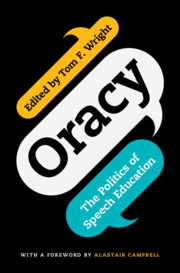Book contents
- Oracy
- Oracy
- Copyright page
- Contents
- Figures
- Tables
- Contributors
- Foreword: The Oracy That Democracy Needs
- Acknowledgements
- Introduction
- Part I Debating Oracy in the UK
- Part II Oracy in Global Context
- Part III Oracy in History and in Theory
- 10 What the Chartists and Suffragettes Realised about Oracy
- 11 From Elocution to Empowerment
- 12 Releasing Civic Voices
- 13 The Trouble with Oracy?
- Index
- References
13 - The Trouble with Oracy?
from Part III - Oracy in History and in Theory
Published online by Cambridge University Press: 23 September 2025
- Oracy
- Oracy
- Copyright page
- Contents
- Figures
- Tables
- Contributors
- Foreword: The Oracy That Democracy Needs
- Acknowledgements
- Introduction
- Part I Debating Oracy in the UK
- Part II Oracy in Global Context
- Part III Oracy in History and in Theory
- 10 What the Chartists and Suffragettes Realised about Oracy
- 11 From Elocution to Empowerment
- 12 Releasing Civic Voices
- 13 The Trouble with Oracy?
- Index
- References
Summary
In this chapter, Deborah Cameron, University of Oxford’s Professor of English Language tackles head on what she calls ‘The Trouble with Oracy’. She identifies several key contradictions and tensions within the oracy movement, including the lack of consensus on goals and definitions, the issue of social class, and the enduring clash between traditional and progressive education philosophies. Despite a contemporary shift towards business-centric goals, she notes, defining essential spoken language skills remains problematic, reflecting broader societal divisions. Though supportive of the aspirations of the oracy movement, she concludes on a sceptical note. To Cameron the complexities in defining "good" communication and the enduring influence of class divisions on educational discourses, will continue to hinder equitable oracy education.
Information
- Type
- Chapter
- Information
- OracyThe Politics of Speech Education, pp. 188 - 200Publisher: Cambridge University PressPrint publication year: 2025
References
Accessibility standard: WCAG 2.2 AAA
Content Navigation
Allows you to navigate directly to chapters, sections, or non‐text items through a linked table of contents, reducing the need for extensive scrolling.
Provides an interactive index, letting you go straight to where a term or subject appears in the text without manual searching.
Reading Order & Textual Equivalents
You will encounter all content (including footnotes, captions, etc.) in a clear, sequential flow, making it easier to follow with assistive tools like screen readers.
You get concise descriptions (for images, charts, or media clips), ensuring you do not miss crucial information when visual or audio elements are not accessible.
You get more than just short alt text: you have comprehensive text equivalents, transcripts, captions, or audio descriptions for substantial non‐text content, which is especially helpful for complex visuals or multimedia.
Visual Accessibility
You will still understand key ideas or prompts without relying solely on colour, which is especially helpful if you have colour vision deficiencies.
You benefit from high‐contrast text, which improves legibility if you have low vision or if you are reading in less‐than‐ideal lighting conditions.
